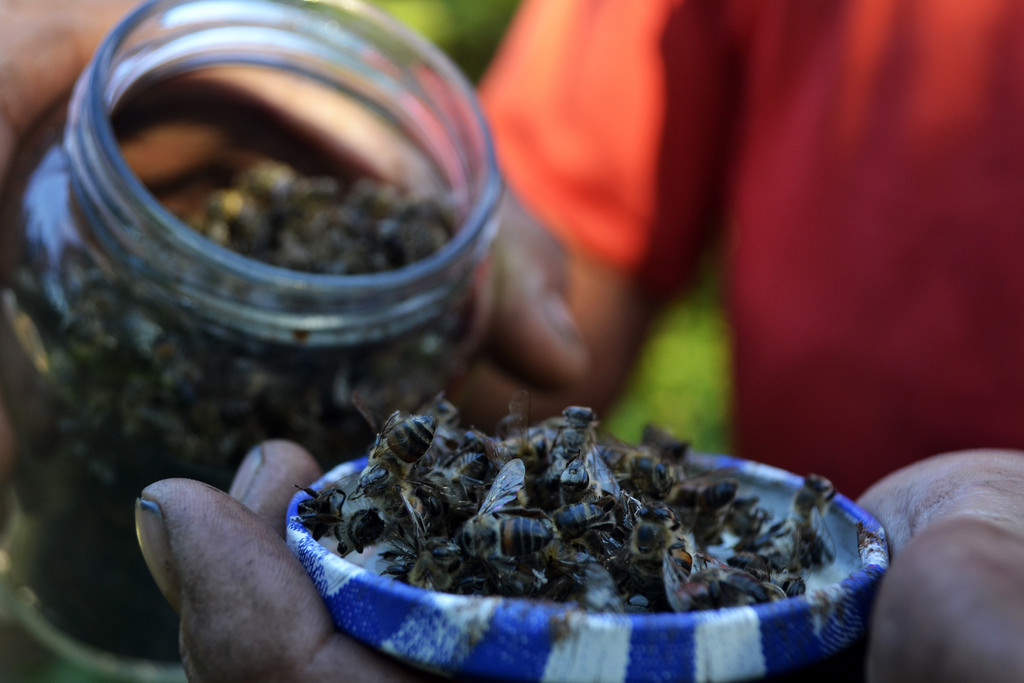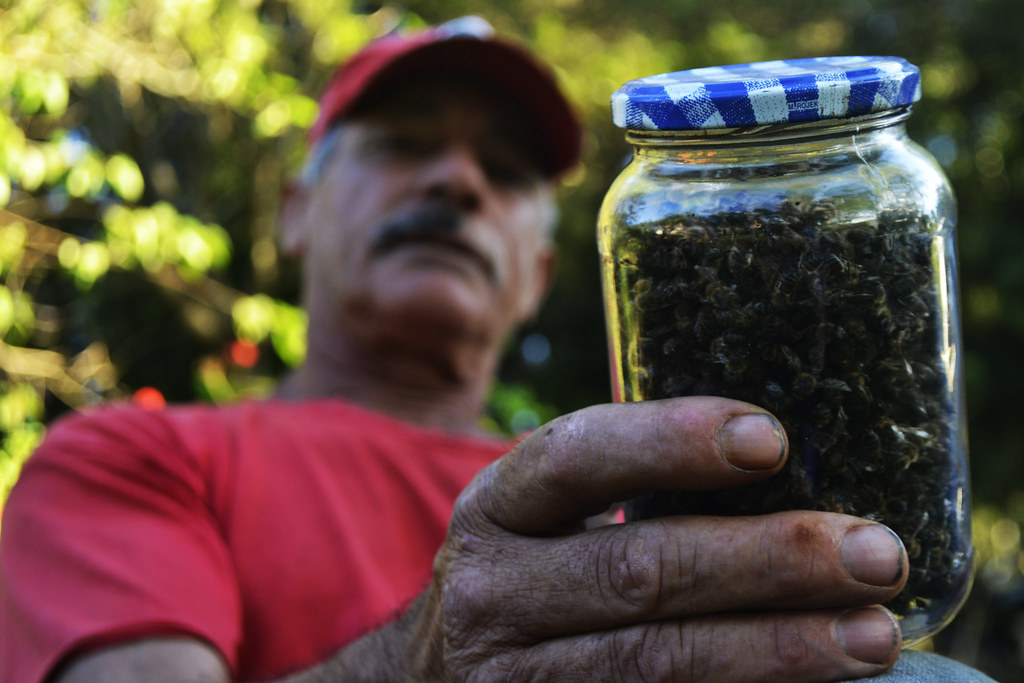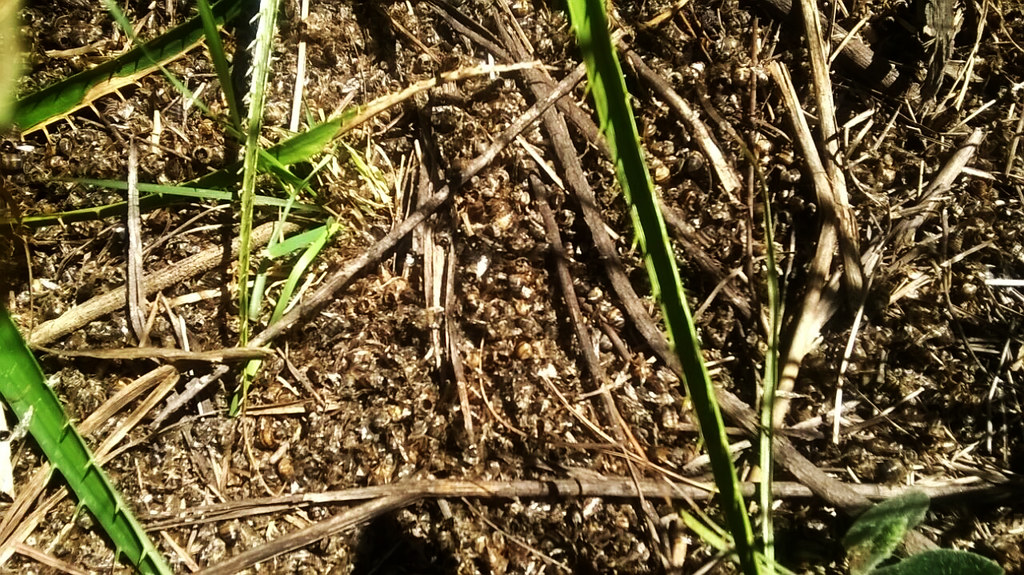
Poison rain kills bees and destroys honey production
reports series shows how the excessive use of pesticides in crops cause irreversible damage to bee community in the state.
By Catiana de Medeiros
Collaboration: Leandro Molina
That since 2009 Brazil leads the ranking of countries that consume poison in the world is already much knowledge of the Brazilian population. The national average is 7,5 per liter. In Rio Grande do Sul the estimated consumption is 8,5 liters per person.
Data indicate that the use without pesticides control in crops, mainly applied by air spraying, cause enormous damage to bees.
Contrary to what many think, these chemicals and harmful to human health and the environment also undertake significantly the production of honey and other foods. The result is that entire hives are dying, and this can affect the whole population in the world production of food.
Since today, publish the series "has its poison in honey", which contains three articles that show the effects of pesticides and transgenic soybeans in the Rio Grande do Sul region Campaign, where dozens of beekeepers see no alternatives to combat the advance of agribusiness in areas of agrarian reform settlements. For this first report, We talked with some honey producers settlers, that count when and how they got to be victims of the problems arising from the agribusiness production model.

"In three hours the bees were all dead"
Sudden death and mass, bees, has worried beekeepers settled agrarian reform Campaign region. fatality, which intensified in the last three years, It shows that there is strong evidence of being related to the transgenic soybean monoculture and the excessive use of pesticides.
Seated in Coal Black municipality, Mr. João Carlos Camargo, 55 years, It works with honey production for over three decades. He says that, over the years, lost some bees by natural and climate issues, but nothing compared to what happened in the last three years, when it intensified planting of transgenic soybeans in the whole region.
"When working with bees is normal to have some loss by insect attacks or lack of food, but in recent years I had total loss of hives and differently from other situations, for they were in great condition ", Camargo explains.
The first mass death of Seated hives occurred in 2014, When, in monitoring work, realized that something abnormal with the bees. That year, he lost his 30 hives, which corresponds to about 2 kilos of honey unharvested.
"They were passing poison nearby Lot, so I went to the hives and saw that bees were dying. Within two or three hours they were all dead. And so it happened in 2015, when also I had total loss, there is nothing left", the Mint.
Mr. Jones reports that in the region, Apart from being surrounded by transgenic soy, Poison application indiscriminately has become an increasingly common practice. "I have no doubt that the death of hives is a result of using poison cocktails without applying any criteria upon earth, aiming a single culture and ending with the bees biodiversity, insects, plants and animals ", rating.
Effects of the disappearance of bees
Pollination is the pollen transport from one flower to another. This process allows the flowers are fertilized, and from there begins the development of fruits and seeds. This is in many ways, is the wind, water or butterflies, for example. Bees have a large capacity pollinated. This type of insect is small in size, but with an efficiency and importance to life on Earth. Without bees there is injury, not only in the production of honey, but all agricultural and crop production, which commits serious way life in general.

Problem is not isolated
The hives of mortality also reached seated Amarildo Zanovello, 48 years, which has in beekeeping the flagship of the family income. He also worked for more than three decades with the production of honey, and now plays cultivation together with other two families nesting Roça Nova, in Candiota.
He recalls that in 1999, when there was no advancement in the region of transgenic soybean, harvested on average 65 kg of honey per hive, which is considered by sitting as high production. According to him, the average production of each hive in Brazil is around 25 kg of honey.
"There had problems with poison, the fields were free and had lots of flowering. But with soy entry, from 2008, the scenario has changed. Today, We reached the average 40 kilograms per hive, and we are still above the national average. Many bees end up contaminating with poisons when they go out to collect nectar. Mostly, to return to the hives, they contaminate and also lead to death other bees ", argues.
The first significant loss of bees Zanovello working group took place between 2012 is 2013, when they were lost 50 hives, the equivalent of two tons of honey. The loss, at the time, It was R $ 20 one thousand. "We were harvesting honey and the bees were all dead. I'm sure it was because of poison. Usually, that ends the life cycle of a bee she flies away, does not die near the hive. We had to destroy everything, He did not yield to enjoy the honey ", remember.
The Seated Elio Francisco Anschau works with honey production for over ten years and is also on the list of victims of poisons and transgenic soybeans. Recently, he lost ten beehives. The lost production was also used for family consumption.
"Deaths are soybean planting consequences, which has increased alarmingly in recent years here in Campaign. The bees still coexist with poisons contraband, that are banned in Brazil, but come easily in the area because it is located near the border. By these factors, honey farming is no longer profitable and does not give more return ", the Mint.
Source:
MST page
http://www.mst.org.br/2016/04/27/chuva-de-veneno-mata-abelhas-e-destroi-producao-de-mel-no-interior-do-rs.html


Sorry, the comment form is closed at this time.